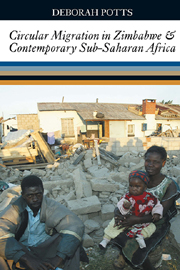Book contents
- Frontmatter
- Contents
- List of Maps, Figures, Tables, Boxes & Photographs
- List of Abbreviations
- Preface
- 1 Introduction
- 2 Regional Paradigms & Approaches to Circular Migration
- 3 Regional Paradigms & Approaches to Circular Migration
- 4 Harare & Zimbabwe
- 5 Migrant Livelihoods & Migration Trajectories in Harare
- 6 Harare Migrants' Rural Links & Assets
- 7 Variations in Migrants' Experience, Perceptions & Options
- 8 Social & CulturalAttachments to Rural Settings & Homes
- 9 Attacking the Urban Poor & Abusing Rural Links Operation Murambatsvina 2005
- 10 Conclusion
- Appendix: Consumer Price Index (all items) for Urban Families 1973–2007
- Bibliography
- Index
10 - Conclusion
Published online by Cambridge University Press: 05 July 2013
- Frontmatter
- Contents
- List of Maps, Figures, Tables, Boxes & Photographs
- List of Abbreviations
- Preface
- 1 Introduction
- 2 Regional Paradigms & Approaches to Circular Migration
- 3 Regional Paradigms & Approaches to Circular Migration
- 4 Harare & Zimbabwe
- 5 Migrant Livelihoods & Migration Trajectories in Harare
- 6 Harare Migrants' Rural Links & Assets
- 7 Variations in Migrants' Experience, Perceptions & Options
- 8 Social & CulturalAttachments to Rural Settings & Homes
- 9 Attacking the Urban Poor & Abusing Rural Links Operation Murambatsvina 2005
- 10 Conclusion
- Appendix: Consumer Price Index (all items) for Urban Families 1973–2007
- Bibliography
- Index
Summary
The evidence presented in this book from Zimbabwe and many other countries across sub-Saharan Africa shows that the population dynamics of African urbanization have changed significantly. In comparison with the early postcolonial decades, the net impact of migration has reduced, and for some towns has even become negligible or occasionally even negative. In Zimbabwe, these changes can be traced in detail with reference to the changing responses and characteristics of in-migrants to its capital city, Harare, from independence in 1980 to the era of its economic collapse in the 2000s. As shown, the attractions of the city for migrants dwindled and their evaluation of the importance of, and future need for, rural economic links grew.
In this concluding chapter, the implications of these shifts will be discussed in relation to four themes. First, I consider the implications of these findings for the actors central to the book – migrants moving in and out of towns – and our understandings of their decision-making and livelihoods. Second, I discuss a range of issues relating to various theoretical and conceptual aspects of understanding migration and African cities and their economic functions, some of which have been addressed in the introductory chapters and are here revisited in the light of the evidence presented. Third, I relate the findings to some contemporary policy discussions about the role of migration and urbanization in development.
- Type
- Chapter
- Information
- Publisher: Boydell & BrewerPrint publication year: 2010



